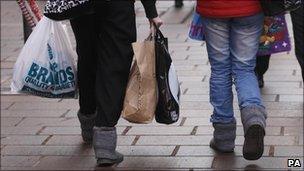Bank of England urged to keep UK interest rates low
- Published

The recent VAT increase is set to push the rate of inflation higher
The Bank of England should "hold its nerve" and avoid pressure to raise interest rates, an influential economics forecaster has said.
The Ernst & Young Item Club says any increase in the bank base rate from the current historic low of 0.5% could endanger the economic recovery.
The Bank should stand firm against temporary pressures such as the VAT rise, it says.
Meanwhile, Deloitte is warning of a "bumpy road to recovery".
In its 2011 UK economic review, it says it expects GDP growth this year and next of just 1.5%.
However, the more-optimistic Item Club forecasts UK GDP growth of 2.3% this year, rising to 2.8% in 2012.
The Bank of England's remit is to control inflation over the medium term.
Its target for inflation on the Consumer Prices Index (CPI) measure is 2%. However, CPI has exceeded that target by more than one percentage point for more than a year and now stands at 3.3%.
The inflation rate as measured by the Retail Prices Index (RPI) is currently 4.7%.
Credibility
Peter Spencer, chief economic adviser to the Item Club, said any rate rise now by the Bank of England would be a mistake.
"If the Bank has been pushed into a rate rise this year it will find itself with a depressed economy, a low rate of inflation below target, and of course having to cut interest rates," he told the BBC.
"That would seriously damage its credibility."
Asked if he was making this warning because he feared people like the prime minister were putting direct pressure on the central bank to raise rates, he replied: "Absolutely that."
'Temporary' pressures
The Item Club said that, as the government's austerity measures started to take effect, inflationary pressures would be coupled with below-trend GDP growth.
It expects commodity price rises and the VAT increase to push CPI inflation close to 4%, but says these are temporary measures and predicts inflation will drop back towards the 2% target in 2012.
Accountancy and consulting firm Deloitte said it believed the UK economy was building up momentum, but that "the true test" - the severe fiscal squeeze - was yet to come.
And it warned that fiscal tightening could lead to a lacklustre recovery over the next couple of years.
Deloitte also said the current rates of inflation would put further pressure on household incomes, although it added that it expected inflation to slow to about 1.8% next year.
Exports
Deloitte said that although government cuts were set to be spread over many years, pain would also be felt in the short-term with public sector employment already falling, VAT having gone up, and a rise in national insurance contributions due in April.
The report said that the only alternative to the government's current strategy appeared to be if the Bank of England's monetary policy committee conducted more quantitative easing and pumped money into the economy.
Deloitte also pointed out that pressure was on the private sector to keep the recovery going, but that questions remained over whether it could generate enough jobs to offset the public sector job cuts.
"The onus is therefore firmly on those parts of the economy which are relatively immune from the direct effects of the fiscal squeeze - namely exports and investment - to drive growth instead," said Deloitte economic adviser Roger Bootle.
"At least exports have been rising strongly. What's more, the recently announced plans for an extra fiscal stimulus in the US should leave the outlook for global demand a bit brighter."